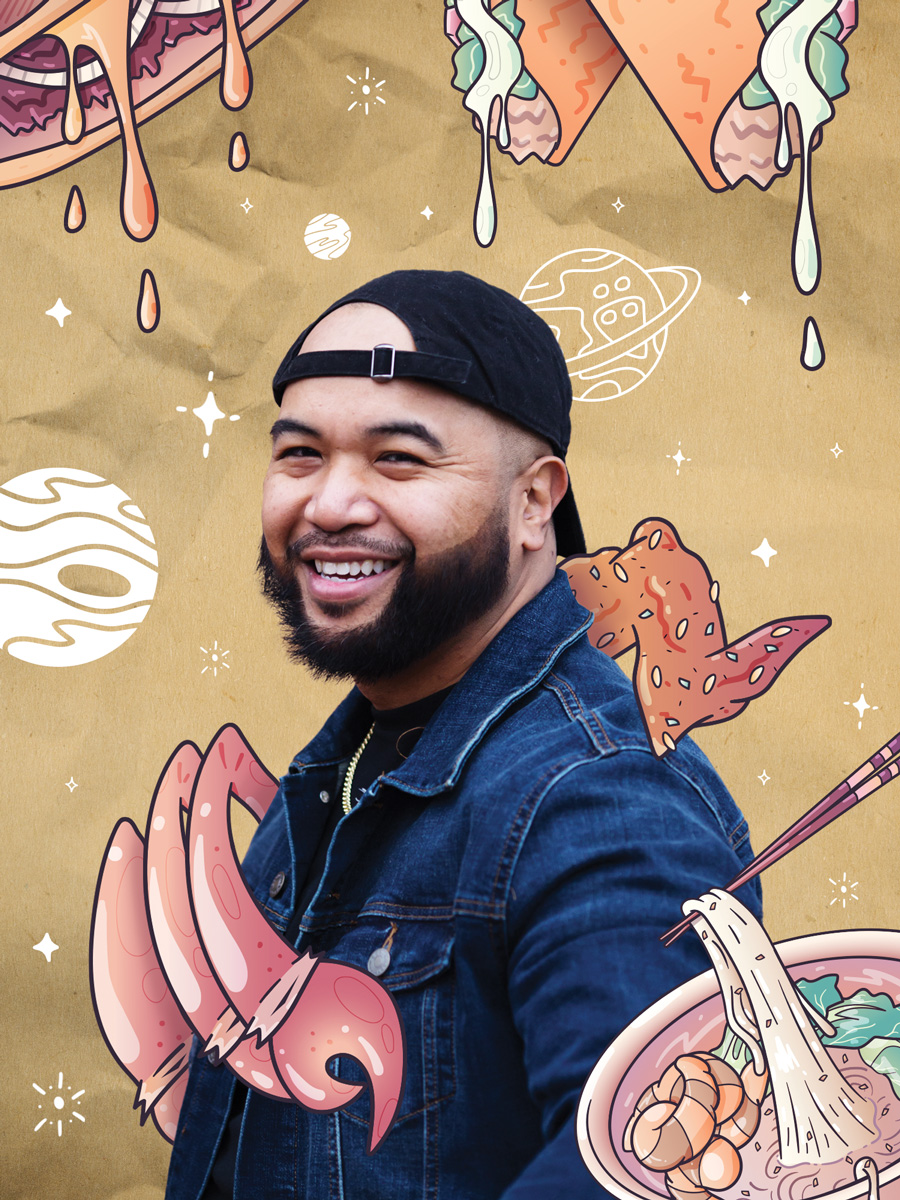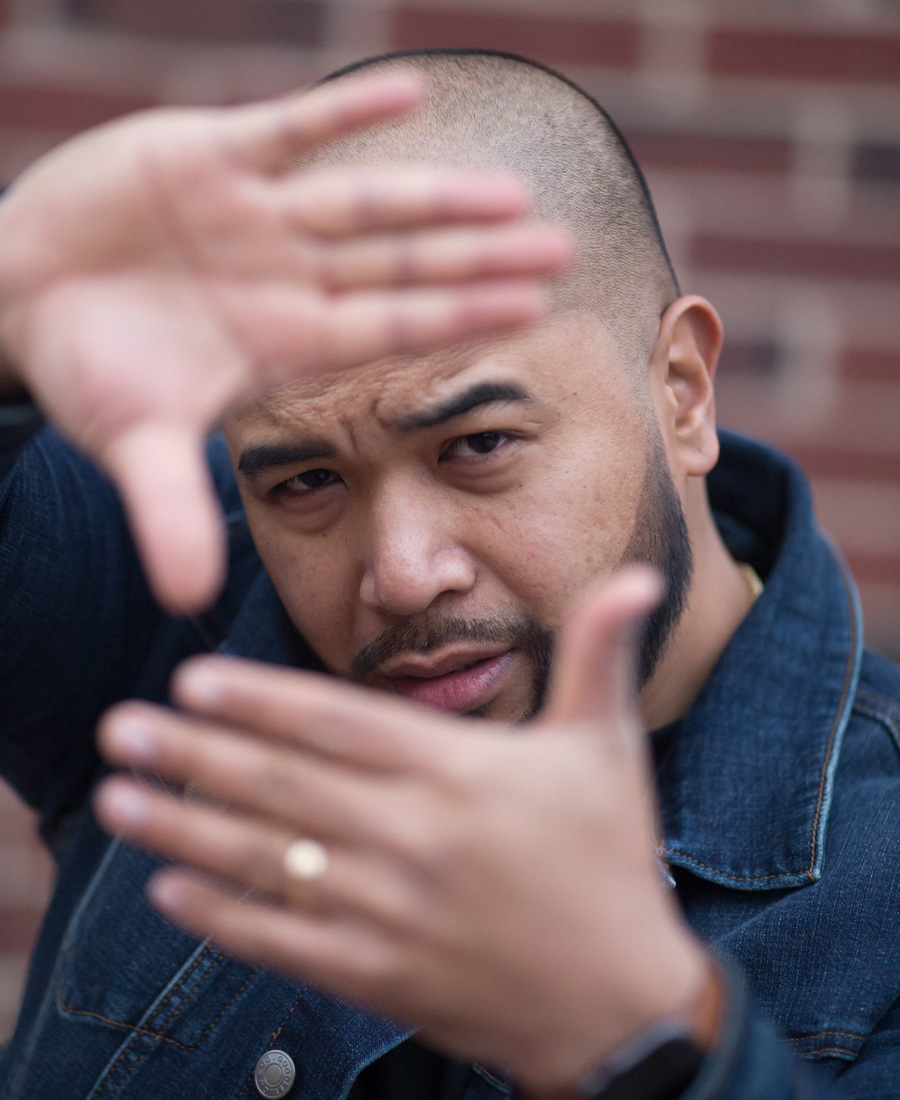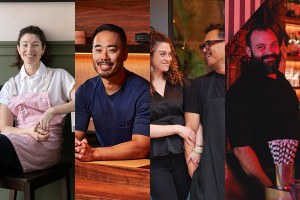YouTuber JL Jupiter Is Boosting Philly’s Under-the-Radar Restaurants, One Viral Video at a Time

JL Jupiter, rapper turned videographer turned prolific vlogger. Photo illustration by Kam Dela
On the Wednesday before Super Bowl LV, JL Jupiter uploaded a new video to YouTube. Set to a boom-bap soundtrack, the crisp 25-minute package chronicled his visit to Cockadoodle Dan’s, a wing and sandwich shop opened mid-pandemic in Palmyra, New Jersey, by Dan Walsh, a Local 57 laborer turned restaurateur.
The response was nearly instantaneous.
“Our phone was ringing off the hook,” says Walsh, who’d been open just over two months at the time. “Super Bowl Sunday, we sold a record number of wings. I had an employee quit. I think it was too much for him.” Customers he’d never seen before kept telling him they’d driven for hours just to try his food, all due to Jupiter’s cosign.
Cockadoodle Dan’s is one of dozens of Delaware Valley businesses blessed by this out-of-nowhere bump. In the past two years, Jupiter, a rapper turned videographer turned prolific vlogger whose real name is Jeff Lek, has racked up a six-figure following and millions of views with his profiles of independent restaurants. He has no professional food background beyond loving to eat. But his genuine approach, along with his knack for mining personal stories that often mirror his own, has helped him build one of the most loyal, engaged and opinionated food followings in the region.
Two weeks before the video dropped, I drove to Palmyra to meet Lek, whom I found, inconspicuous in a camo jacket over black sweats and Jordan 3s, shooting B-roll on the River Line platform across the street from Cockadoodle Dan’s. His energy is remarkably unassuming for someone with the ability to make it rain payroll-sustaining dining dollars with a video endorsement. After pulling the owner out front for a brief interview — he encourages Walsh to do all the talking — Lek, DSLR tucked close to his chest, weaves unobtrusively through the kitchen, capturing staffers dropping fryer baskets, working the flat-top, saucing drums and flats.
When it comes time to actually eat all the food, Jupiter sticks his camera on a mini tripod and sits down in front of it. Typically, this is when a vlogger affects some version of that look-at-me voice so de rigueur in the form. But for Lek, turning the lens on himself only reinforces his earnest enthusiasm.
“All right — peace, everyone, and welcome to another episode of JL Jupiter TV,” he begins, before Walsh and his employees start flooding the table with their menu signatures — the “Batman and Robin,” a combo beef-and-chicken cheesesteak; a chicken cutlet with roasted peppers and mozzarella; tray after tray of wings: OG Hot, Diablo, Mango Habanero. Jupiter leads his own sort of mukbang, sampling everything in a manner free of pretense or hifalutin food-critic language, while I, his awkward guest taster, try hard not to spill anything down my shirt for the 70,000-plus who’ll eventually watch.
Lek was raised 20 minutes away, in Woodlynne, but he wasn’t born there. Not so incidentally, many of the small businesses he profiles — West African spots in West Philly, birrierias in Bridgeton, chicken pho specialists in Kensington, Korean wing destinations in Cheltenham — are run by people like him: immigrants working to make the most of an opportunity.
Celebrating international cuisines by centering the narrative on the people who know their own cooking best seems like an obvious concept, but it’s something at which much larger outlets throughout food media are notoriously inept. For Lek, 41, the approach comes naturally; he amplifies these stories “because of how I grew up. I identify with the struggle — just trying to make it.”
Lek’s grandfather, Lek Sovath, was a well-known singer and comedian who performed for the Cambodian royal family. His grandmother, Ly Ngar Srey, worked as a government customs agent, a position that was rare for women to hold at the time. During holidays, they would organize celebratory meals to share with their neighbors in suburban Phnom Penh. No one else owned a television, so Sovath would run extension cords on the 25-inch black-and-white set and drag it into their front yard so everyone could enjoy special broadcasts.
When the Khmer Rouge overthrew the U.S.-backed republican government in Phnom Penh on April 17, 1975, the Leks were forced to relocate to the countryside — part of the Khmer Rouge’s plan for a classless agrarian society. Sovath, who was away in the Pursat province at the time of the coup, never returned. The family believes he was one of the nearly two million Cambodian citizens murdered by the Khmer Rouge in its four-year genocide.
The remaining family members were subjected to long days of backbreaking manual labor, systematic starvation, and incessant indoctrination of the Khmer Rouge’s beliefs. After the fall of the Khmer Rouge regime in early 1979, the family landed at Nong Samet, a refugee camp on the northwest border between Thailand and Cambodia. This was where Jeff was born in 1980.
Volatile and violent, with sporadic-at-best access to food and medicine and no clear paths to resettlement, the camp wasn’t a safe or sustainable option. The family walked eight hours through the jungle to reach Khao-I-Dang, a different camp managed by the UN’s refugee agency and the Thai Interior Ministry. That kick-started the long sponsorship and resettlement process that would eventually land them in Philadelphia, along with more than 3,000 other Southeast Asian refugees sponsored for resettlement by Philadelphia-area agencies, churches and organizations in the late ’70s and early ’80s.

Photograph courtesy JL Jupiter
Upon landing here, the family — infant Jeff, his brother, Pete, and their mother, plus two uncles, one aunt and Jeff’s grandmother — was placed in a single apartment in West Philly. The roof leaked, and there were no beds, so everyone slept on the floor. They couldn’t afford milk or formula, so they nursed Jeff with a bottle of hot water and sugar. Pete, now 43, remembers collecting chairs and pillows off the sidewalk on trash nights to furnish their new home.
“It was broken-down — all of us in one room. But we were so happy,” Rick Lek, Jeff’s uncle, recalls.
Nowadays, Rick works as a machinist in the aeronautics industry, but in those years, Rick worked as a busboy — morning shifts at the airport Marriott, then directly to the Wyndham in the city from afternoon to late-night. Other family members baked doughnuts, worked in chicken-processing plants, picked blueberries.
Rick was able to buy a used Volkswagen Rabbit, which all seven of them would pack into to go grocery-shopping at Asian markets in South Philly — the best way they knew to stay connected to Cambodia. Eventually, the family was able to pool enough money to purchase a modest house in Woodlynne, between Camden and Collingswood — odds-defying genocide survivors to American homeowners in the span of about four years.
Though he was just an infant, Lek acknowledges the persistence of generational trauma. “It’s deep-rooted in our family,” he says. “We’re all still affected by it. But I try to keep my composure, for my mom and my family.”
Despite being pretty much the only Asian kids in Woodlynne at the time, Pete and Jeff led relatively all-American childhoods. They both played baseball and basketball at Collingswood High, but Jeff, taking after the grandfather he never got to meet, gravitated toward music. Music is what led him to link up with Kawan “Wan Miz” Moody and Calvin “Pryme Mega” Bayard III, Camden natives who are his two closest friends and frequent YouTube associates.
“You could tell that this guy was going somewhere, even though he may not have figured it out there and then,” says Bayard. He met Lek in 1998, in a freshman English class at Rutgers-Camden. They bonded over their shared love of hip-hop and began recording together. Bayard produced several songs on the 2011 JL Jupiter album Resident Alien, which explores Lek’s refugee past. Lek credits Bayard with helping coin his “JL Jupiter” moniker — sampling Queen on a track got them talking about Freddie Mercury, leading Lek to stick his initials in front of the name of another planet.
“Don’t matter the space, the crowd, whatever — some people just know how to fit in,” says Moody, who’s known Lek about as long; the trio has recorded and performed as Nu-Treez in addition to their solo work.
“His platform is not to be a food critic,” says his wife, Triana Martinez. “It’s to highlight these small businesses.”
Lek’s social intelligence is the secret sauce that’s helped him develop his ever-growing following. Food media at large, whether print, broadcast or online, too often addresses audiences from positions of assumed authority, making it very easy for them to end up explaining immigrants’ own cuisines and cultures back to them — often incorrectly. While it shouldn’t be, Lek’s knack for striking a balance between leading the narrative and falling back to let the subjects of his videos speak for themselves is rare. He’s less an arbiter of quality than an open-minded tour guide, a role he invests in by interacting closely with his audience, frequently relying on them for tips and recommendations. He rarely announces himself ahead of time and always pays for his meals.
“His platform is not to be a food critic,” says his wife, Triana Martinez. “It’s to highlight these small businesses.”
High frame rates, slick editing, and eye-catching production quality — how many food vlogs out there feature drone shots? — are hallmarks of Lek’s visual brand. If they remind you of music videos, it’s because music videos are how Lek used to make a living. Without any formal training, he began experimenting with videography a decade ago. “He was damn good already in 2012,” says Bayard. “But then it was like he was turned up; he was possessed.”
Lek shifted his creative focus from creating music himself to crafting visuals for other artists under the name Planetary P. “I got to where I was able to do five music videos in one day, editing everything down in an hour and a half,” he says. But while he loved the work, the money was inconsistent. “I needed an exit plan,” he says. “I wanted to use my video skills to somehow have an effect on the community and mix that all in with something that I love. And that’s food.”
If you peruse Lek’s channel, you see his focus creeps toward the consumable in early 2018. There are clips on Khmer cooking, along with restaurant visits and some personal glimpses, like a vlog of a baby shower for his and Triana’s now almost-three-year-old son, Jael. “In my early videos, I’m really just nervous,” he says. “But it’s good to mess up on YouTube, so you know what you want to do.” He needed just one viral moment to level up — and that came in January 2019, when he dropped a video filmed at Harlem Taste in New York.
Accompanied by his friend Hella Chluy, a Cambodian musician and comedian, Lek filmed the preparation and hasty inhalation of a chopped cheese, the simple sandwich that’s the bodega’s claim to fame. The combination of appetizing subject matter, clever editing, and charismatic commentary, sprinkled with a cheeky touch of rivalry-stoking language in the title (“Better than a Philly Cheesesteak?”), cracked that elusive code. “That gained a lot of interaction and blew me up to where it propelled me to over 10,000 followers,” Lek says of the eight-minute, 39-second clip, which had almost 650,000 views as of early 2021. “Then I started building momentum.”
That same month, Lek struck gold on another audience-boosting video, this one much closer to home. Joined by Moody and Bayard, Lek visited Harvinskin’s in Camden to highlight its seafood cheesesteak, a house specialty of chopped salmon, veggies, melted American, jumbo shrimp and secret seasonings. On film, Lek declared it a “game changer” — his in-house term for a dish that stands out from the rest.
Owner Robert Muse is honest about the fact that his restaurant had been struggling. After serving 12 years in federal prison on drug conspiracy charges, Muse came on as an investor in support of his chef-partner, Harmon Ford. When Ford passed away a few years in, Muse, with no culinary experience, was forced to man the kitchen to help out Latasha Gaylord, Ford’s fiancée.
“Without Lek coming in here and giving us the publicity that he gave us, we would have shut down,” says Muse. Before the video, “For us to make $500 was a good day. Now, on our worst day, we make $2,000. This man changed my life. That’s the honest-to-God truth.”
By April 2019, Lek’s 10K subscribers had tripled. Harvinskin’s, meanwhile, has invested in a larger grill and additional fryers and is still selling almost 200 seafood cheesesteaks daily, COVID be damned.
Lek says that if anything, the pandemic’s devastating effect on restaurants has motivated him to expend even more time and energy on creating content, while acknowledging that the public’s conscious rededication to spending local has had a positive effect on his reach and growth. “In a way, what I’m doing came at a perfect time because of these COVID-19 times,” he says. “I try to get everyone to make it out there [to support restaurants], going really hard, putting in that overtime.”
Travel ends up being the most time-consuming portion of Lek’s hustle; editing, he says, is where he gets into his real groove. He typically posts two to three videos a week, regularly racking up 70,000 to 100,000 views and often more. This past January, Lek received the Silver Creator Award, a play-button-shaped plaque from YouTube to acknowledge his crossing of the 100,000-subscriber threshold. He added an additional 25,000 in the month of February alone, putting him on pace to reach as many as 375,000 subs by the end of the year — an exciting prospect for someone who started how and where he did.
YouTube’s monetization rates vary greatly, but a rough, oft-cited rubric within the industry is that ad revenue translates to anywhere from $3 to $5 per 1,000 views. For a creator like Lek, whose channel has earned upward of 18 million views to date, that could be a full-time salary with continued growth. He hasn’t yet dedicated himself solely to YouTube — he balances shooting and editing with a maintenance job at a local university — but that’s the plan.
“Hopefully, I’ll get to have that talk with my wife in the near future — that’s one of the goals I have,” says Lek. It would be, to borrow his term, a game changer — for him, for our restaurants, for all those invested in Philly’s food community.
Published as “JL Jupiter Rising” in the April 2021 issue of Philadelphia magazine.


